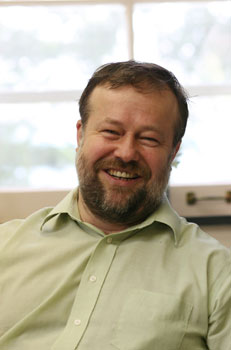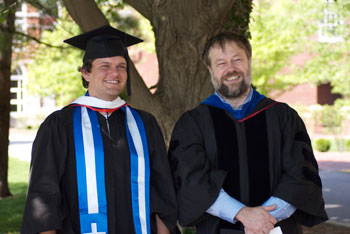 Peter Mikek was an undergraduate at the University of Maribor in his native Slovenia when the world turned upside down.
Peter Mikek was an undergraduate at the University of Maribor in his native Slovenia when the world turned upside down.
“When I started at the university I was taking political economy classes that were full-fledged socialist/Marxist versions of economics,” says the professor with the most recognizable accent on campus. “By the time I finished, we were reading Paul Samuelson’s Economics, a canonical work being used as a textbook in America at that time.
“In four years, the old world was gone.”
Mikek lived through the greatest redefining moment in his country’s history—in 1990, 88 percent of the electorate voted for independence from socialist Yugoslavia, and by 1991 the Republic of Slovenia was born.
And in 1993, this baker’s son raised Catholic in a communist country—a top student of economics and politics there who never joined the Communist Party—would begin his own long journey to bring his rare perspective and a strong commitment to teaching from the mountains of Slovenia to Baxter Hall.
Today, Mikek works from the office previously occupied by Political Science Professor Ed McLean H’08, and this morning he’s sharing it with his son, Benjamin. The walls are covered with posters of mountains—the landscape of Slovenia.
“It is a beautiful country,” he says, pointing to an alpine meadow in one of the photographs. “My home is only 10 miles from the Austrian border. I do miss the mountains.”
So his students have given him posters of the mountains of their own countries and of those they’ve visited —the Himalayas of Nepal and China share space on the wall above a four-leafed clover from John Holmes ’09. A whistle from Mexico, a plaque from Professor Peter Bankart that reads “Thou Shalt Not Whine” and another from Benjamin bearing the quote “Never Give Up” rest on a table where Benjamin is doing his homework. He speaks to his father in a language I don’t recognize.
“Slovenian,” Mikek says. “Both of my boys, Benjamin and Luka, are bilingual. To keep them interested, I used to tell them we have a secret language.”
There are only two million Slovenian speakers in the world, so that’s not too far of a stretch.
“It’s a window into a different world for them—a different culture, different proverbs, for them to be aware there is a world beyond the United States.”
Mikek’s determination to expose others to the vista of a larger world extends to his students. He’s taken them to Europe twice on immersion trips as part of a course on the European Union.
“Two of those students had never been on a plane before, and several had not been out of the country,” he says. “And three students went to the opera in Frankfurt—their own choice—the first time they’d seen opera in their lives.
“We prepare them to take advantage of these opportunities to embrace a new culture. Wabash takes students a long way in many ways!”
Mikek recognizes that teaching at Wabash means more time with students outside of the classroom.
“They come with all sorts of issues—personal, financial, academic. Sometimes my door is closed the whole afternoon because the conversations in here are private. When students trust me enough to bring such a personal thing to me, I take it as a great compliment. It may be time consuming, but it’s very important.
“And sometimes I have no advice for them; sometimes all you can do is listen as a friend.”
The posters on his wall and gifts from students testify to those friendships.
“I’m a jerk about one thing—well, at least one thing,” Mikek laughs. “I don’t accept a gift from a student if there’s a chance I’ll be teaching him again. That would be a conflict of interest.”
The professor’s research focuses on the European Union and the fiscal regimes of its newer members, and his Wabash classes include Money and Banking and International Finance. But asked for “teachable moments” from his five years at Wabash, Mikek smiles and offers examples from the College’s Cultures and Traditions course. He has fond memories of the time he asked students to act out sections of Aristophanes’ comedy The Clouds. Another of teaching Han Feitzu’s concept of the “legalist ruler.”
Mikek’s fondest memory finds students asking all the questions.
“One day I came into class, sat down, and said nothing,” he recalls. “This was a great group, but at first they were confused. Still, I said nothing. Finally, one of the students says, ‘Aha,’ and poses a question from the text they’d read. Soon they’re all asking questions of each other, discussing the text. I didn’t say a thing.”

Mikek credits colleagues in the Economics Department for helping him to become a better teacher and adjust to the culture of Wabash. In June, Mikek attended his second conference on interactive teaching, and he continues to refine his classes for majors. But he also draws on experience, the changes he’s seen in the world. And he encourages his students to explore that world, to move outside of their own culture and comfort zone.
“I tell them this is the time of their lives to be adventurous.”
Wabash lore is full of “small world” coincidences, but here’s one for the books.
While pursuing his doctorate at IU, Mikek met and married Jane Hardy, and the couple moved to Slovenia for five years, where they taught at the university. When they decided to move back to the U.S., Mikek was scanning an online site and found a job opening at Wabash.
“We must apply here,” he said. And for good reason. While Jane Hardy is now assistant professor of Spanish here, she is also the daughter of Charles Hardy ’55, who was hired by Ben Rogge in 1958 to teach political science at Wabash. Mikek knew well his father-in-law’s respect for the teaching and learning that happens at Wabash.
Mikek puts it this way: “Here’s an American father with a Slovenian son-in-law who comes to work at the college he loves. I’m very glad it worked out!”
Raising a family 5,000 miles from his birthplace, Mikek has made his share of adjustments.
It’s a very different landscape.
“When you grow up in the mountains, they don’t just give you a view,” Mikek explains. “They give boundaries to your world. When I came to Indiana, I dissolved into this horizontal space; there’s no end, no boundaries to it. You melt into it.
“Yet when I go back to Slovenia and the mountains now, I find it pressing, because I’m used to this wide open world.”
During a panel discussion on campus last year about immigration, Mikek spoke of how it felt to be an outsider in America—to be speaking Slovenian in a restaurant and having people stare at you, or having “Where are you from?” be the first question people ask when they hear you speak.
“But last spring at a conference I was talking to my colleagues about this, and I discovered that everybody has a story like mine. Mine is just fresh. Perhaps it was your father, or your grandmother, who experienced what I’ve experienced. But mine is not a unique story; mine is the American story. Okay, the first generation has an accent, but the second doesn’t.
“It’s all part of what makes this country so rich—there are so many Americas. When I go back to Slovenia and they ask me to tell them about America, I’ll say, ‘Which America? Are we talking about California? A Polish neighborhood in Chicago? A black neighborhood in New Orleans?’”
As Benjamin walks back into the office and reminds his father that it’s time for lunch, I ask the professor with the posters of the mountains on his wall, “Where do you feel most at home?”
“It is no longer a geographic thing for me,” he says as we follow Benjamin out the door. “Home is wherever my family is.”
Photo Above: Bradley Armstrong ’09 and Professor Mikek celebrated Armstrong’s graduation last May.
 Peter Mikek was an undergraduate at the University of Maribor in his native Slovenia when the world turned upside down.
Peter Mikek was an undergraduate at the University of Maribor in his native Slovenia when the world turned upside down. Mikek credits colleagues in the Economics Department for helping him to become a better teacher and adjust to the culture of Wabash. In June, Mikek attended his second conference on interactive teaching, and he continues to refine his classes for majors. But he also draws on experience, the changes he’s seen in the world. And he encourages his students to explore that world, to move outside of their own culture and comfort zone.
Mikek credits colleagues in the Economics Department for helping him to become a better teacher and adjust to the culture of Wabash. In June, Mikek attended his second conference on interactive teaching, and he continues to refine his classes for majors. But he also draws on experience, the changes he’s seen in the world. And he encourages his students to explore that world, to move outside of their own culture and comfort zone.